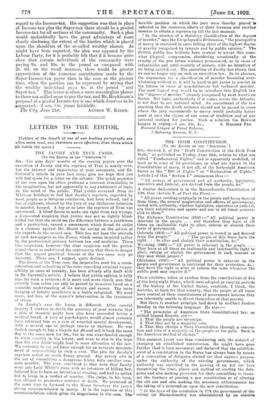LETTERS TO THE EDITOR.
[Letters of the length of one of our leading paragraphs are often more read, and therefore more eliective, than those which fill treble the space.] THE JACOBY A_ND TRUE CASES.
(To THE EDITOR OT THE " SPECTATOR."] Sut,—The nine slays' wonder of the evening papers over the execution of Jacoby and the reprieve of True is nearly over, but the interest and importance of your comments, and Dr. Carswell's article in your last issue, give me hope that you will find space for a letter on the subject. The quick sequence of one case upon the other produced a contrast stimulating to the imagination, but not apparently to any.rudiments of logic, in the mind of the public. That public returned from its Whitsun holidays to find that Jacoby's reprieve, regarded by most people as a foregone conclusion, had been refused, and a boy of eighteen, cleared by the jury of any deliberate intention to murder, hanged. A day or so later the reprieve of True was announced. A blind desire to make one right from two wrongs, a deep-seated suspicion that justice was not so tightly blind- folded but that she could see the difference between a gentleman and a pantry-boy, caused a resentment which found its outlet in a clamour against Mr. Shortt for acting on the advice of the experts in the second case. This has not been the attitude of such newspapers as the Times, which seems inspired rather by the professional jealousy between law and medicine. These two suspicions, however—the class suspicion and the profes- sional—have so embittered the controversy that there is danger that the urgent practical lessons of the two cases may go unlearnt. These are, I suggest, quite distinct.
The lesson of the True case, the imperative need for a recon- sideration and redrafting of the rules regarding criminal respon- sibility in cases of insanity, has been already ably dealt with in Dr. Carswell's article. I believe that public opinion is fully ripe for such a revision; it is more and more clearly seen that security from crime can only be gained by measures based on a scientific understanding of its nature and causes. The mere hanging of lunatic murderers is a feeble safeguard. We need more, not less, of the expert's intervention in the treatment of crime.
In Jacoby's case the lesson is different. After careful inquiry I venture to doubt the accuracy of your surmise that a plea of insanity might here also have succeeded before a medical board. A jury of psychologists would almost certainly have returned him as a case of retarded mental development, with a mental age of perhaps twelve or thirteen. He was foolish enough to buy a bicycle for £6 and sell it back the same day to the same man for 10s., but he was clear-headed enough to write sensibly to his lawyer, and even to rise to the hope that his own death•might lead to some alteration of the law. We certainly do not yet know enough for an accurate measure- ment of responsibility in such a case. The plea for Jacoby's reprieve rested on much firmer ground. Any person who in the act of committing a dangerous felony kills another com- mits murder. The jury, convinced as they wero that Jacoby went into Lady White's room with no intention of killing her believed him to have an intention of stealing, and had no option but to bring in a verdict of murder. The judge, in his turn, was obliged to pronounce sentence of death. He promised at the same time to forward to the Home Secretary the jury's strong recommendation to mercy. It is the rejection of this recommendation which gives its importance to the case. The
terrible position in which the jury were thereby placed Is reflected in the strenuous efforts•of their foreman and another member to obtain a reprieve up till the last moment.
" In the absence of a statutory classification of the degrees of murder," says the Encycloptedia.Britannica, "the _prerogative of mercy is exercised in cases falling short of the highest degree of gravity recognized by lawyers and by public opinion." The British public has hitherto been content to accept this some- what illogical compromise, shuddering occasionally at the cruelty .of the pro forma sentence pronounced, as in eases of infanticides and until recently of minors, with no intention of its being carried out. The execution of Jacoby has shown that we can no longer• rely on such an unwritten law. In its absence, the arguments for a classification of murder becoming over- whelming without it, it will be hard to get juries to convict in, the future in cases of non-deliberate but technical -murder. The most logical way would be to introduce into English law the " degrees of murder " already recognized by most American States. But logic, particularly if it comes across the Atlantic, is not dear to our national mind. An amendment of the law enacting that the death sentence should not be passed in cases where the jury recommends to mercy would probably better meet at once the claims of our sense of tradition and of our national instinct for justice. Such a solution the Howard League is urging.—I am, Sir, &c., S. Masezar Fay. Howard League of Penal Reform, 7 Dalmeny Avenue, N. 7.


































 Previous page
Previous page